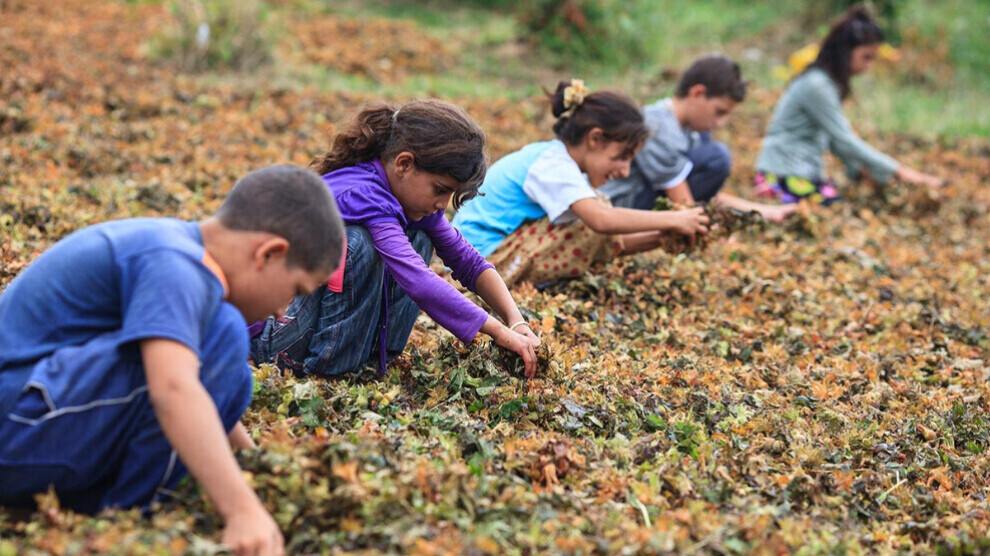Child labor in Turkey: About 60 minors die at work every year
Child labor is widespread in Turkey. Lawyer Ömer Sansarkan of the Amed Bar Association's Child Rights Center reports seven recorded child labor deaths in April alone.
Child labor is widespread in Turkey. Lawyer Ömer Sansarkan of the Amed Bar Association's Child Rights Center reports seven recorded child labor deaths in April alone.

Exploitation of children is everyday business in Turkey and North Kurdistan. Whether it is the production of cheap jeans and disposable T-shirts or the agricultural production of cherries and hazelnuts for the European market, the consumption of such products from Turkey and North Kurdistan robs many young people of their childhood and some even of their lives. The agricultural workers, who are forced to work without any protection, are often from Kurdistan. The unbearable working conditions are compounded by discrimination and racist attacks. The Children's Rights Center of the Amed (Diyarbakır) Bar Association warns that child labor has increased significantly over the past decade due in part to changes in the education system. According to the chamber, at least seven children died from labor in April alone, and officially about 60 minors die at work each year.
Lawyer Ömer Sansarkan reports that the April deaths occurred in Bursa, Amed and Osmaniye. Of the seven children and teenagers who died at work, only two were over 15 years old. The majority were agricultural workers.
Young lives lost in agriculture
Sansarkan said, "Families who go to work with their children are not entitled to be paid for their children's work. The employer only pays adult wages. Therefore, families with children are more profitable for employers. Although the families with children who are thus deprived of any rights keep suing, the law favors the employer. For example, the courts do not impose criminal penalties when people under 18 die due to workplace accidents, such as at construction sites. The courts base their reasoning on the argument of 'neglect' and do not impose penalties.
Although it is known that child labor is prohibited in construction, the contractors responsible for the deaths of children are not punished. Because the outcome of these court cases is so predictable, these contractors do not care whether the children live or die. When children as young as eight or ten die in farm work, it is blamed on the parents as 'neglect.' So the families are blamed in these cases. In any case, the justice system protects the employers."
Education system supports child labor
Sansarkan pointed out the AKP regime's education reform (4+4+4) as one of the causes of the increase in child labor, stating, "With the introduction of the new education system, child labor in Turkey has increased sevenfold, according to TURKSTAT data. Abroad, there is even talk of a twelvefold increase. According to official figures, there are currently two million working children in Turkey. I do not speak here at all of the dark number. If we add these, we reach a much higher number. The education system makes it possible to continue education in the 'open apprenticeship' after four years of elementary school. There, education is not controlled. At the age of ten, you can shoot down your educational career. This problem can be the reason for the increase in child labor, but also for child marriages. That's why we need to return to the old model immediately."
“60 children die every year"
Regarding the work of the bar associations in this context, Sansarkan told, "The bar associations are trying to do something about it, but many don't even have a child rights center. Child labor is handled as part of the human rights departments. In the region, there is only one active child rights department in the Amed Bar Association. Turkey-wide, such departments also exist in Ankara, Istanbul and Izmir.
Among these, Amed performs the best work. And yet, here in our country, there are also many shortcomings. For example, we cannot create publicity on the issue of child labor. Actually, this would be very possible together with the civil society organizations working on the topic. Because every year more than 60 children die at work in Turkey. On the one hand, the number of minors working is increasing, and on the other hand, dozens of children die."
Changes in the law necessary
To change the situation, Sansarkan believes that changes in the law are particularly necessary: "The employment of children is strictly forbidden under the constitution. But the Labor Code states that young people over the age of 14 are allowed to work. This contradiction must be cleared up. After all, the law is not above the Constitution. If a control mechanism was established in all areas, from child education to health, there could be some improvements.
Moreover, if a Turkish citizen forces a child to beg, it does not go to court, but if a Syrian or another migrant does it, the case goes directly to the criminal court. If the sanctions applied to Syrian refugees were also implemented against families of Turkish nationals, children could not be forced to beg so easily."